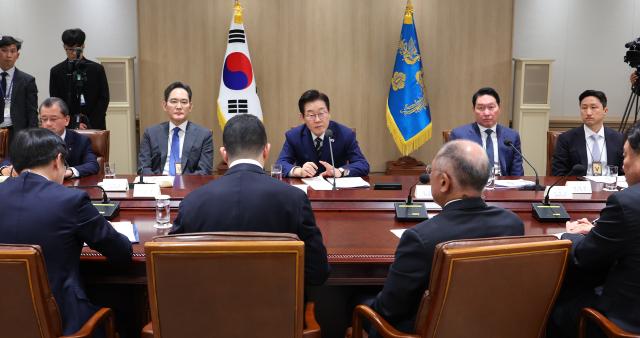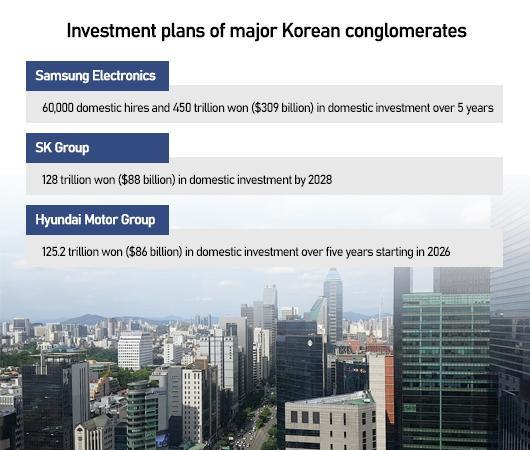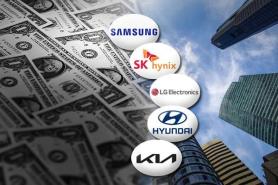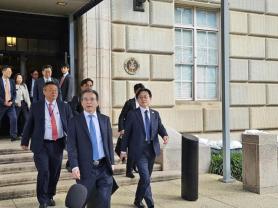
The massive investment plans were laid out during a two-hour meeting with President Lee Jae Myung on Sunday, just days after Seoul and Washington electronically signed a memorandum of understanding for a sweeping industrial trade package. The deal lowers U.S. tariffs on Korean exports and includes $200 billion in Korean capital injections in the United States and $150 billion in bilateral shipbuilding cooperation.
Under the agreement, tariffs on key Korean automobile and pharmaceutical exports will be cut to 15 percent, while semiconductor tariffs will be kept “no less favorable” than the rates applied to Taiwan.
The meeting was attended by Samsung Electronics Chairman Lee Jae-yong, SK Group Chairman Chey Tae-won, Hyundai Motor Group Executive Chair Chung Euisun, LG Group Chairman Koo Kwang-mo, as well as senior leaders from HD Hyundai and Hanwha.
President Lee urged the chiefs to ensure domestic investment does not lag behind U.S. commitments.
“Some worry that U.S.-centered investment may weaken domestic activity,” he said. “I trust you will make sure those concerns do not become reality. Given Korea’s serious regional imbalance, I ask for even greater commitment to revitalizing local industries.”

Samsung: Expanding domestic manufacturing, 60,000 new hires and national AI infrastructure
Samsung Electronics Chairman Lee Jae-yong ensured no reduction in domestic investment, highlighting hiring commitments and new industrial sites outside the capital region.
Samsung confirmed plans to invest 450 trillion won over five years, hire 60,000 workers, and expand advanced manufacturing capacity across memory semiconductors, displays and next-generation batteries.
Samsung will begin construction of the fifth production line at its Pyeongtaek mega-campus, aiming for operation by 2028. The company is also building two major AI data centers in South Jeolla hosting 15,000 GPUs, and an AI service center in Gumi for Samsung affiliates. Samsung SDS, Samsung Display, Samsung SDI and Samsung Electro-Mechanics are each expanding facilities in Asan, Gwangju, Ulsan and Busan.
SK Group: Yongin mega-fabrication site may reach 600 trillion won
SK Group Chairman Chey Tae-won said domestic investment requirements have grown significantly due to demand for high-performance memory and advanced manufacturing technologies.
SK had initially projected 128 trillion won in domestic investment by 2028. But Chey said that the Yongin semiconductor cluster alone may require up to 600 trillion won over the coming years. “As each fab begins partial operations, we are adding more than 2,000 jobs per facility,” Chey said. “If construction accelerates, SK could create 14,000 to 20,000 jobs per year through 2029.”
Hyundai Motor Group: 125 trillion won through 2030 — AI, robotics and green energy at the core
Hyundai Motor Group Chairman Chung Eui-sun unveiled a 125 trillion won domestic investment program for 2026–2030, the largest in the company’s history.
The amount would sharply exceed its investment of 89 trillion won over the last five years.
It will allocate 50.5 trillion won to new businesses including AI autonomous driving, robotics and hydrogen energy, 38.5 trillion won to R&D, and 36.2 trillion won to manufacturing upgrades and facility investments.
Hyundai will build a high-power AI data center with Nvidia, expand robotics testing through a new Physical AI Application Center, and invest in a 1GW PEM hydrogen electrolysis plant in the southwest region. New EV and hydrogen fuel cell factories are underway in Ulsan and scheduled to open between 2026 and 2027.
The company will also cover U.S. tariff burdens for key auto-parts suppliers this year and extend support to secondary and tertiary vendors.
LG Group: Strengthening the supply chain with 100 trillion won
LG Group Chairman Koo Kwang-mo said LG will invest 100 trillion won domestically over five years, assigning 60% to materials, components and equipment — the backbone of long-term competitiveness.
LG is also expanding AI-powered factory automation for both LG plants and partner SMEs, citing successful productivity gains from earlier pilots.
* This article, published by Aju Business Daily, was translated by AI and edited by AJP.
Copyright ⓒ Aju Press All rights reserved.




